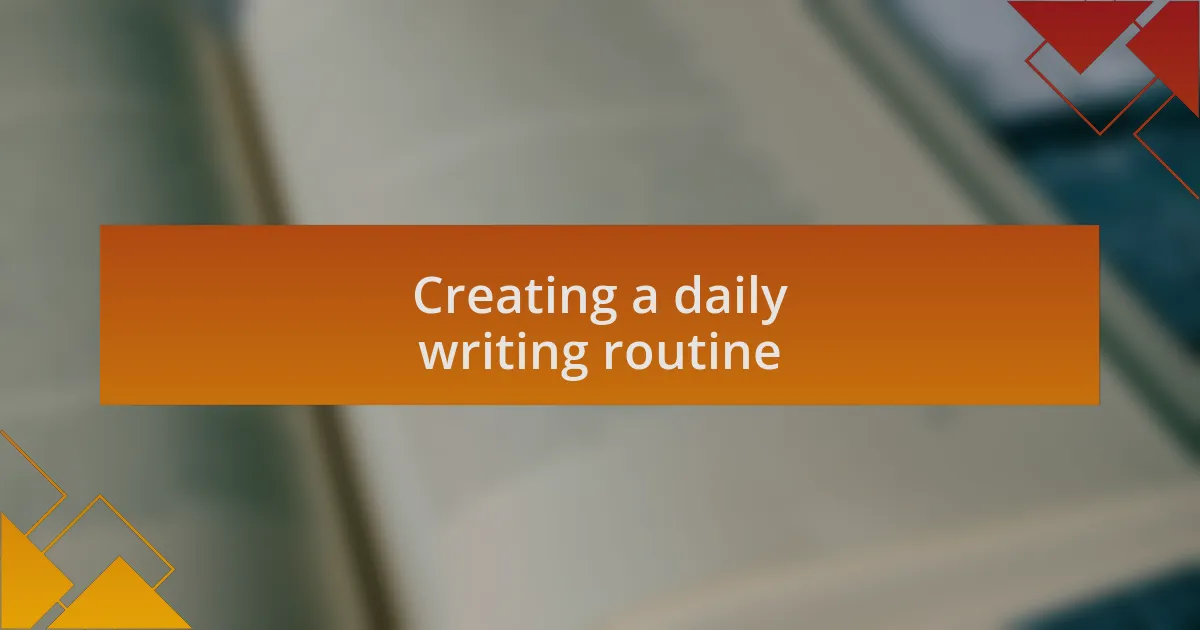Key takeaways:
- Independent publishing grants authors creative control and a personal connection to their work.
- Establishing a consistent writing schedule enhances productivity and combats procrastination.
- Setting achievable writing goals and celebrating small victories maintains motivation and reduces overwhelm.
- Overcoming obstacles like writer’s block and self-doubt is essential for writers’ growth and resilience.

Understanding independent publishing
Independent publishing, to me, feels like a journey where the writer truly takes the wheel. I remember the first time I decided to self-publish a short story—I felt exhilarated yet terrified. How could I possibly bring my vision to life without the backing of a traditional publisher? It turns out, embracing this challenge opened a world of creative freedom that I never knew existed.
One of the most appealing aspects of independent publishing is the control it gives authors over their work. For instance, I once received feedback suggesting I change my book cover. While it was tempting to follow this advice, I chose to stay true to my original design. This decision not only strengthened my connection to the project but also taught me the importance of trusting my instincts in the publishing process.
Navigating the independent publishing landscape can be daunting, especially with so many options available. Have you ever felt overwhelmed by the choices? I sure have. Each decision, from formatting to marketing, teaches you something new about your craft and your audience, reinforcing that this path, while challenging, is ultimately empowering.

Importance of a writing schedule
A writing schedule is essential for turning aspirations into achievements. When I first started writing, I often found myself waiting for inspiration. But I soon realized that creativity thrives on consistency. By setting aside specific times to write each day, I found that my ideas flowed more freely, and my productivity soared.
Establishing a routine helped me combat procrastination, a common hurdle many independent authors face. I remember the times I’d sit at my desk, staring blankly at the screen, unsure of what to write. It wasn’t until I committed to a writing time—often early mornings before the world awakened—that I began to churn out pages with purpose and clarity. How often do we let distractions pull us away from our goals? A well-structured schedule can act as a protective barrier against those distractions, allowing for focused creativity.
Moreover, a consistent writing schedule aids in building discipline, which is crucial for any budding author. There were days when I’d sit down to write, only to be met with self-doubt. Yet, by showing up regularly, even on the tough days, I built the resilience to push through those moments of insecurity. I learned that each word I wrote, regardless of its quality, was a step forward in my journey. How do you feel about committing to a daily writing practice? Embracing this discipline transformed my approach, and I wholeheartedly believe it can do the same for you.

Setting achievable writing goals
Setting achievable writing goals is about finding the right balance between ambition and reality. In my own experience, I used to dream of writing a novel in a month, which sounded exciting but was utterly overwhelming. Instead, I learned to break that grand vision into manageable chunks—like focusing on a chapter or even a few paragraphs each week. This adjustment made my goals not only sustainable but also far less intimidating. How often do we set ourselves up for failure by aiming too high too soon?
Another crucial aspect is being realistic about my time and energy levels. There were days when my schedule was packed with other commitments, and I felt guilty for not writing. I had to remind myself that progress can be slow but steady. On particularly busy days, I found that setting a timer for just 15 minutes of focused writing was enough to keep the momentum going, allowing me to feel accomplished without adding stress. Can we really expect to write every day at our peak creative times?
Lastly, celebrating small victories kept me motivated. I remember when I finished my first draft; it felt monumental—even though I knew revisions were ahead. I made a habit of rewarding myself for reaching those smaller milestones, whether it was an extra cup of coffee or a night off to binge-watch my favorite show. These little incentives made the journey enjoyable rather than a chore. What are some small wins you can celebrate on your path to becoming a published author?

Creating a daily writing routine
Creating a daily writing routine has been a game-changer for my productivity. At first, I struggled with consistency, often waiting for inspiration to strike. But then I realized that treating writing like an appointment was essential. I chose a specific time each day—usually early in the morning—when my mind was fresh and free from distractions. How often do we overlook the power of routine?
There were days when it felt like pulling teeth, sitting down to write those first few sentences. I experienced this genuine frustration, and it led me to experiment with different writing environments. Sometimes, I would move to a cozy café or the local library, where the atmosphere sparked creativity. Finding a spot that resonates with you can transform your writing session from a chore into a delightful escape. Have you found your ideal writing haven yet?
One of my favorite techniques is the “10-minute rule.” I often tell myself that I only need to write for ten minutes to get started, and once I begin, I usually find my flow. This trick not only eases the anxiety of starting but also helps me push past procrastination. It’s surprising how often the hardest part is simply sitting down and committing to those ten minutes. What little strategies have you discovered that help you conquer the blank page?

Tools to manage your schedule
Managing my writing schedule effectively has been greatly aided by various tools that keep me organized and focused. For instance, I’ve found digital calendars, like Google Calendar, invaluable. They allow me to set reminders and block off dedicated writing time. Have you ever missed a writing session simply because you didn’t have it scheduled? With a calendar, I can visually see my commitments, which helps me prioritize my writing time alongside other responsibilities.
Another tool I swear by is the Pomodoro Technique. By working in focused bursts of 25 minutes followed by a 5-minute break, I maintain high levels of concentration. I still vividly remember my first experience with it; I managed to complete a significant portion of a chapter within just a couple of sessions. This method not only keeps the momentum going but also refreshes my mind, proving that short breaks can enhance productivity. Have you ever noticed how a simple reset can clear your mental fog?
Lastly, I’d be remiss not to mention apps like Trello or Notion for tracking my writing projects and ideas. They provide a flexible platform to organize notes, tasks, and deadlines all in one place. I vividly recall a time when I felt overwhelmed with multiple projects; these tools helped me break down tasks visually. It’s amazing how seeing everything laid out can alleviate anxiety and keep me accountable. What’s your preferred method for staying organized?

Overcoming common writing obstacles
Writing often comes with a host of obstacles, but I’ve learned to tackle them head-on. For instance, I used to struggle with writer’s block, which felt like a massive wall I couldn’t scale. Then I discovered that stepping away from my desk and changing my environment, even just a walk around the block or a change of scenery, can spark new ideas. Have you ever noticed that sometimes, inspiration strikes when you least expect it?
Procrastination tends to creep into my writing routine, especially on days when motivation feels elusive. I realized that setting smaller, manageable goals—like writing just 200 words—can make the task seem less daunting. This shift in mindset has transformed my approach, helping to maintain a steady flow of ideas. Have you found that breaking projects into bite-sized pieces can change your perspective on tackling them?
Another common hurdle is self-doubt, which has haunted me for years. I can remember staring at a blank page, questioning whether my words were worthy. Implementing a practice of sharing my drafts with trusted peers for feedback made a world of difference. Their encouragement often reminds me that my voice matters, providing a much-needed confidence boost. How do you combat self-doubt when you sit down to write?

Reflecting on my writing journey
Reflecting on my writing journey brings back a whirlwind of memories and lessons learned. I remember my early days, typing away late at night with dreams of being published dancing in my head. Each success, no matter how small, filled me with a sense of disbelief and pride. Isn’t it amazing how far dedication can take you?
There were moments, though, when looking back felt overwhelming. I can vividly recall the time I thought about quitting after receiving harsh feedback from an editor. It felt like a punch to the gut, but it was precisely that experience that taught me resilience. Have you ever faced a setback that turned into a stepping stone toward growth?
Now, with each draft, I find myself savoring the process, viewing it not just as a means to an end but as a significant part of my journey. Embracing both successes and failures has helped me mature as a writer. Through it all, I’ve learned that the value lies not only in the stories I tell but also in the evolution of my voice. What lessons have your writing experiences imparted to you?